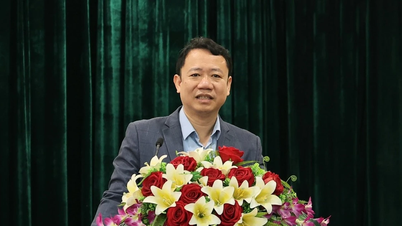
Medical experts recommend that women should be cautious when using long-term birth control pills and should discuss carefully with their doctors to choose the appropriate birth control method - Photo: PATCHARIN SIMALHEK
The study was conducted by the French National Agency for Safety of Medicines and Health Products (ANSM) and published in the medical journal BMJ on June 17. Accordingly, scientists analyzed the medical records of more than 92,000 women, including more than 8,000 who had undergone surgery to remove meningiomas.
The analysis found that women who used birth control pills containing desogestrel continuously for more than five years had a 1 in 17,331 risk of developing a meningioma requiring surgery. This figure dropped to 1 in 67,300 in women who used the pills for less than five years.
Although these are very small percentages, the researchers assert that the association is statistically significant and should be monitored in clinical practice.
It is noteworthy that this risk tends to decrease after stopping the use of desogestrel. Specifically, after only about a year of not using it, the risk of meningioma was no longer recorded in the group of women who had used the drug. This suggests that the link between desogestrel and meningioma may be temporary and reversible if detected early.
Desogestrel is a synthetic progestogen hormone, commonly used in hormonal contraceptives to replace the body's natural progesterone hormone.
In addition to desogestrel, the study also looked at another synthetic progestogen, levonorgestrel, which is commonly used in intrauterine devices or emergency contraceptive pills.
The results showed no increased risk of meningioma in women using levonorgestrel, even with prolonged use of more than five years. This is a positive sign, suggesting that levonorgestrel may be a safer option for women who need long-term contraception.
According to medical experts, meningiomas are usually benign tumors that develop from the membranes that surround the brain and spinal cord. Although not cancerous, these tumors can cause neurological symptoms such as headaches, visual disturbances or weakness, and in some cases, require surgery to remove them.
The link between progestogen-containing contraceptives and meningiomas has been suggested before, but this study provides more reliable data due to its large size and high precision.
Dr. Gilles Reuter, a neurosurgeon at the University Medical Center of Liège (Belgium), who was not involved in the study, said that in cases of meningiomas associated with desogestrel use, stopping the drug could cause the tumor to regress and even avoid surgery.
From an obstetrics and gynecology perspective, Dr. Gino Pecoraro of the University of Queensland (Australia) said that this discovery is not intended to cause undue concern, but is a reminder for women to proactively consult experts when choosing a contraceptive method suitable for their physical condition and personal needs.
Although desogestrel remains a safe and effective option in many cases, experts recommend avoiding prolonged, continuous use unless absolutely necessary, and increasing regular medical monitoring, especially when signs of neurological abnormalities appear.
The use of hormonal drugs in general should be individualized and under the supervision of a physician to ensure optimal contraceptive effectiveness while still being safe for long-term health.
Source: https://tuoitre.vn/uong-thuoc-tranh-thai-keo-dai-tang-nguy-co-u-mang-nao-20250620060204911.htm




![[Photo] Da Nang: Hundreds of people join hands to clean up a vital tourist route after storm No. 13](https://vphoto.vietnam.vn/thumb/1200x675/vietnam/resource/IMAGE/2025/11/07/1762491638903_image-3-1353-jpg.webp)




































































































Comment (0)